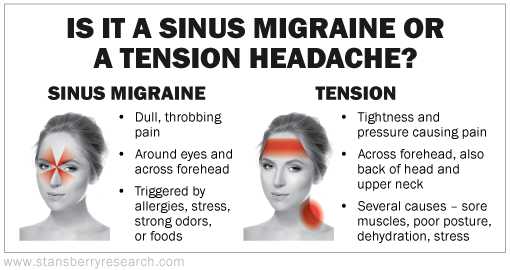Across the U.S., many of us go outside and see the same thing – sheets of pollen covering our cars every morning.
For about 50 million Americans, that only means one thing... It's the beginning of headache season.
Seasonal allergies include symptoms like a runny nose, congestion, sneezing, itchy eyes, and pressure in the sinus cavity. In fact, sometimes your sinus pressure leads to a headache.
That kind of pain has us reaching for one of the many over-the-counter drugs marketed to relieve an "allergy and sinus headache" or "sinus pressure and pain."
But what would you say if I told you most "sinus headaches" aren't from your sinuses?
A 2004 study found that about 90% of folks complaining of a sinus headache actually had a migraine.
A true sinus headache happens when you experience inflammation of your sinus cavity. The inflammation causes dull or throbbing pain in your face around your eyes and across your forehead.
One way to recognize a sinus headache is if you bend over and the pain gets worse. That's from the pressure on the sinuses. You might also get symptoms of a sinus infection like a fever, excessive mucus, or congestion.
But a migraine is different...
Allergies often serve as a trigger for migraines. That means you can experience hay fever symptoms like congestion and excessive mucus. You might also feel a throbbing headache in your forehead if a migraine starts. Although migraines typically appear only on one side of the head, they can also cause pain in your forehead... similar to a sinus headache.
If you have allergies, your risk for migraines is much higher than the non-allergic population. And one study out of Pakistan showed that migraine frequency is four times higher for folks with allergies. That's why treating your allergies also combats this migraine trigger.
Also, if it's your forehead that hurts, it might not even be allergies at all. It could be a tension headache instead.
Tension headaches have plenty of different causes, but usually not allergies. However, if you're feeling sick and suffering from allergies this time of year, chances are you're also stressed. And stress is the leading cause of tension headaches.
Tension headaches also form from dehydration to poor posture or sore muscles – even sleeping the wrong way on your neck can trigger a headache the next day. Tension headaches feel like a tight pain or pressure that often runs in a band around your head (including your forehead), but also affects the back of your head, particularly just above your neck.
So, if you're facing headaches this spring, figure out if it's due to your sinuses or tension. And try one (or all) of these three fixes to help:
Fix No. 1: Clean out your nose. I've written before about using a Neti pot to clear out my sinuses during allergy season. It helps to alleviate the pressure and clear out any irritants. Likewise, keeping an air purifier in your bedroom will help filter out any pollen or other allergens.
Fix No. 2: Hydrate. Dehydration causes many of the headaches we get. Our brains are about 75% water, so when we start to lose that water, our brains actually shrink. That change triggers pain, which is our body's way of telling us to drink more.
I usually only get headaches after I work out and don't hydrate or stretch enough. So, whenever you feel a headache starting, go for water right away.
And remember, drinks with caffeine and alcohol do the opposite – they'll make you more dehydrated. That's why I recommend a glass of water after every glass of wine.
Fix No. 3: Massage. Massage is one of the best headache relievers. Because so many tension headaches result from sore neck muscles, a good massage can help alleviate the pain. Plus, stress-busting techniques like listening to music and meditating can also help with tension headaches.
Adding these three fixes to your routine will help ward off many headaches, along with the other unpleasant symptoms of allergy flare-ups.
What We're Reading...
- Don't miss our issue on how to benefit from meditation.
- Something different: Is sitting shrinking our brains?
Here's to our health, wealth, and a great retirement,
Dr. David Eifrig and the Health & Wealth Bulletin Research Team
April 17, 2018

